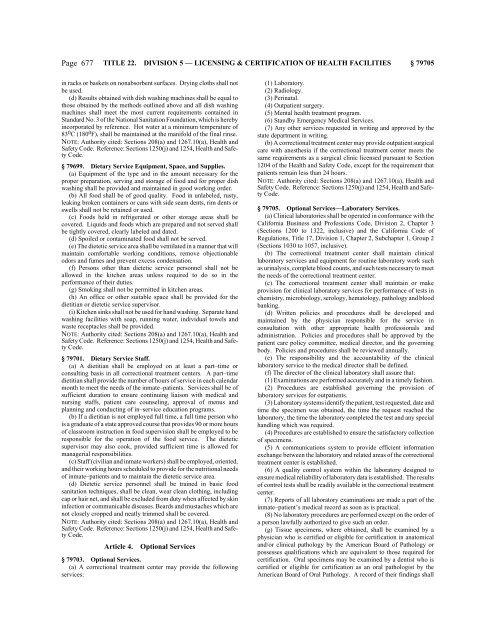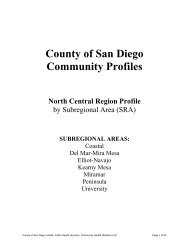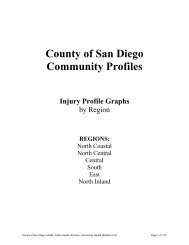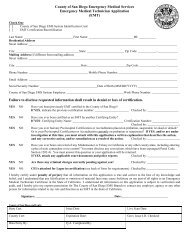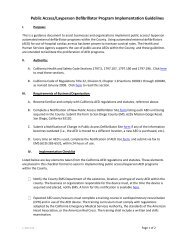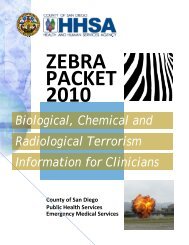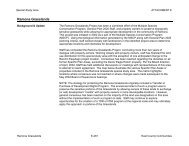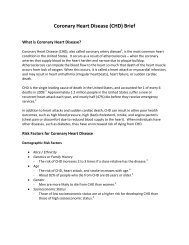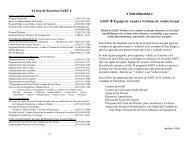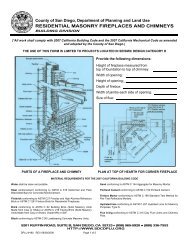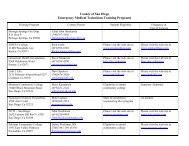CALIFORNIA CODE OF REGULATIONS - State of California
CALIFORNIA CODE OF REGULATIONS - State of California
CALIFORNIA CODE OF REGULATIONS - State of California
You also want an ePaper? Increase the reach of your titles
YUMPU automatically turns print PDFs into web optimized ePapers that Google loves.
Page 677<br />
TITLE 22. DIVISION 5 — LICENSING & CERTIFICATION <strong>OF</strong> HEALTH FACILITIES § 79705<br />
in racks or baskets on nonabsorbent surfaces. Drying cloths shall not<br />
be used.<br />
(d) Results obtained with dish washing machines shall be equal to<br />
those obtained by the methods outlined above and all dish washing<br />
machines shall meet the most current requirements contained in<br />
Standard No. 3 <strong>of</strong> the National Sanitation Foundation, which is hereby<br />
incorporated by reference. Hot water at a minimum temperature <strong>of</strong><br />
83 0 C (180 0 F), shall be maintained at the manifold <strong>of</strong> the final rinse.<br />
NOTE: Authority cited: Sections 208(a) and 1267.10(a), Health and<br />
Safety Code. Reference: Sections 1250(j) and 1254, Health and Safety<br />
Code.<br />
§ 79699. Dietary Service Equipment, Space, and Supplies.<br />
(a) Equipment <strong>of</strong> the type and in the amount necessary for the<br />
proper preparation, serving and storage <strong>of</strong> food and for proper dish<br />
washing shall be provided and maintained in good working order.<br />
(b) All food shall be <strong>of</strong> good quality. Food in unlabeled, rusty,<br />
leaking broken containers or cans with side seam dents, rim dents or<br />
swells shall not be retained or used.<br />
(c) Foods held in refrigerated or other storage areas shall be<br />
covered. Liquids and foods which are prepared and not served shall<br />
be tightly covered, clearly labeled and dated.<br />
(d) Spoiled or contaminated food shall not be served.<br />
(e) The dietetic service area shall be ventilated in a manner that will<br />
maintain comfortable working conditions, remove objectionable<br />
odors and fumes and prevent excess condensation.<br />
(f) Persons other than dietetic service personnel shall not be<br />
allowed in the kitchen areas unless required to do so in the<br />
performance <strong>of</strong> their duties.<br />
(g) Smoking shall not be permitted in kitchen areas.<br />
(h) An <strong>of</strong>fice or other suitable space shall be provided for the<br />
dietitian or dietetic service supervisor.<br />
(i) Kitchen sinks shall not be used for hand washing. Separate hand<br />
washing facilities with soap, running water, individual towels and<br />
waste receptacles shall be provided.<br />
NOTE: Authority cited: Sections 208(a) and 1267.10(a), Health and<br />
Safety Code. Reference: Sections 1250(j) and 1254, Health and Safety<br />
Code.<br />
§ 79701. Dietary Service Staff.<br />
(a) A dietitian shall be employed on at least a part–time or<br />
consulting basis in all correctional treatment centers. A part–time<br />
dietitian shall provide the number <strong>of</strong> hours <strong>of</strong> service in each calendar<br />
month to meet the needs <strong>of</strong> the inmate–patients. Services shall be <strong>of</strong><br />
sufficient duration to ensure continuing liaison with medical and<br />
nursing staffs, patient care counseling, approval <strong>of</strong> menus and<br />
planning and conducting <strong>of</strong> in–service education programs.<br />
(b) If a dietitian is not employed full time, a full time person who<br />
is a graduate <strong>of</strong> a state approved course that provides 90 or more hours<br />
<strong>of</strong> classroom instruction in food supervision shall be employed to be<br />
responsible for the operation <strong>of</strong> the food service. The dietetic<br />
supervisor may also cook, provided sufficient time is allowed for<br />
managerial responsibilities.<br />
(c) Staff (civilian and inmate workers) shall be employed, oriented,<br />
and their working hours scheduled to provide for the nutritional needs<br />
<strong>of</strong> inmate–patients and to maintain the dietetic service area.<br />
(d) Dietetic service personnel shall be trained in basic food<br />
sanitation techniques, shall be clean, wear clean clothing, including<br />
cap or hair net, and shall be excluded from duty when affected by skin<br />
infection or communicable diseases. Beards and mustaches which are<br />
not closely cropped and neatly trimmed shall be covered.<br />
NOTE: Authority cited: Sections 208(a) and 1267.10(a), Health and<br />
Safety Code. Reference: Sections 1250(j) and 1254, Health and Safety<br />
Code.<br />
Article 4.<br />
Optional Services<br />
§ 79703. Optional Services.<br />
(a) A correctional treatment center may provide the following<br />
services:<br />
(1) Laboratory.<br />
(2) Radiology.<br />
(3) Perinatal.<br />
(4) Outpatient surgery.<br />
(5) Mental health treatment program.<br />
(6) Standby Emergency Medical Services.<br />
(7) Any other services requested in writing and approved by the<br />
state department in writing.<br />
(b) A correctional treatment center may provide outpatient surgical<br />
care with anesthesia if the correctional treatment center meets the<br />
same requirements as a surgical clinic licensed pursuant to Section<br />
1204 <strong>of</strong> the Health and Safety Code, except for the requirement that<br />
patients remain less than 24 hours.<br />
NOTE: Authority cited: Sections 208(a) and 1267.10(a), Health and<br />
Safety Code. Reference: Sections 1250(j) and 1254, Health and Safety<br />
Code.<br />
§ 79705. Optional Services—Laboratory Services.<br />
(a) Clinical laboratories shall be operated in conformance with the<br />
<strong>California</strong> Business and Pr<strong>of</strong>essions Code, Division 2, Chapter 3<br />
(Sections 1200 to 1322, inclusive) and the <strong>California</strong> Code <strong>of</strong><br />
Regulations, Title 17, Division 1, Chapter 2, Subchapter 1, Group 2<br />
(Sections 1030 to 1057, inclusive).<br />
(b) The correctional treatment center shall maintain clinical<br />
laboratory services and equipment for routine laboratory work such<br />
as urinalysis, complete blood counts, and such tests necessary to meet<br />
the needs <strong>of</strong> the correctional treatment center.<br />
(c) The correctional treatment center shall maintain or make<br />
provision for clinical laboratory services for performance <strong>of</strong> tests in<br />
chemistry, microbiology, serology, hematology, pathology and blood<br />
banking.<br />
(d) Written policies and procedures shall be developed and<br />
maintained by the physician responsible for the service in<br />
consultation with other appropriate health pr<strong>of</strong>essionals and<br />
administration. Policies and procedures shall be approved by the<br />
patient care policy committee, medical director, and the governing<br />
body. Policies and procedures shall be reviewed annually.<br />
(e) The responsibility and the accountability <strong>of</strong> the clinical<br />
laboratory service to the medical director shall be defined.<br />
(f) The director <strong>of</strong> the clinical laboratory shall assure that:<br />
(1) Examinations are performed accurately and in a timely fashion.<br />
(2) Procedures are established governing the provision <strong>of</strong><br />
laboratory services for outpatients.<br />
(3) Laboratory systems identify the patient, test requested, date and<br />
time the specimen was obtained, the time the request reached the<br />
laboratory, the time the laboratory completed the test and any special<br />
handling which was required.<br />
(4) Procedures are established to ensure the satisfactory collection<br />
<strong>of</strong> specimens.<br />
(5) A communications system to provide efficient information<br />
exchange between the laboratory and related areas <strong>of</strong> the correctional<br />
treatment center is established.<br />
(6) A quality control system within the laboratory designed to<br />
ensure medical reliability <strong>of</strong> laboratory data is established. The results<br />
<strong>of</strong> control tests shall be readily available in the correctional treatment<br />
center.<br />
(7) Reports <strong>of</strong> all laboratory examinations are made a part <strong>of</strong> the<br />
inmate–patient’s medical record as soon as is practical.<br />
(8) No laboratory procedures are performed except on the order <strong>of</strong><br />
a person lawfully authorized to give such an order.<br />
(g) Tissue specimens, where obtained, shall be examined by a<br />
physician who is certified or eligible for certification in anatomical<br />
and/or clinical pathology by the American Board <strong>of</strong> Pathology or<br />
possesses qualifications which are equivalent to those required for<br />
certification. Oral specimens may be examined by a dentist who is<br />
certified or eligible for certification as an oral pathologist by the<br />
American Board <strong>of</strong> Oral Pathology. A record <strong>of</strong> their findings shall


